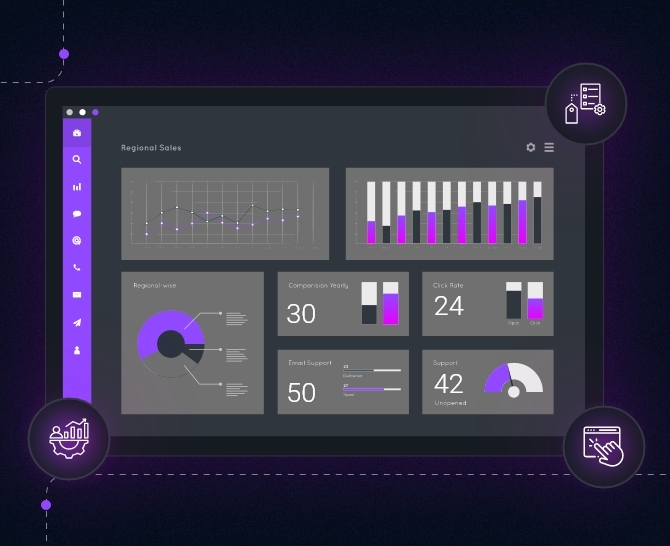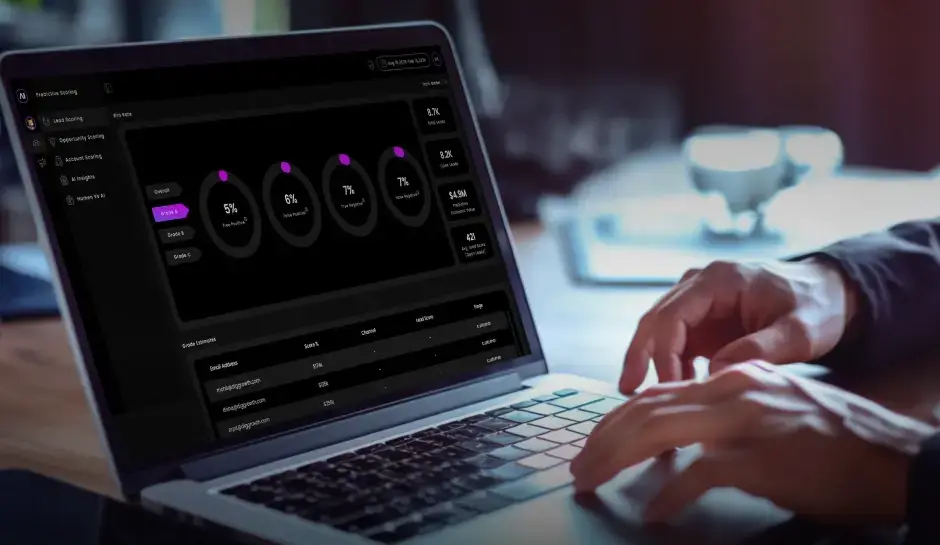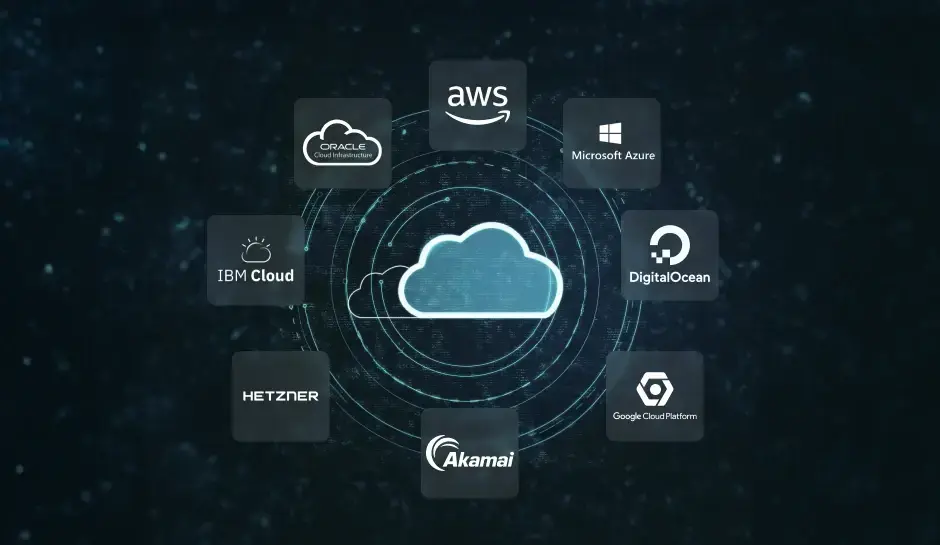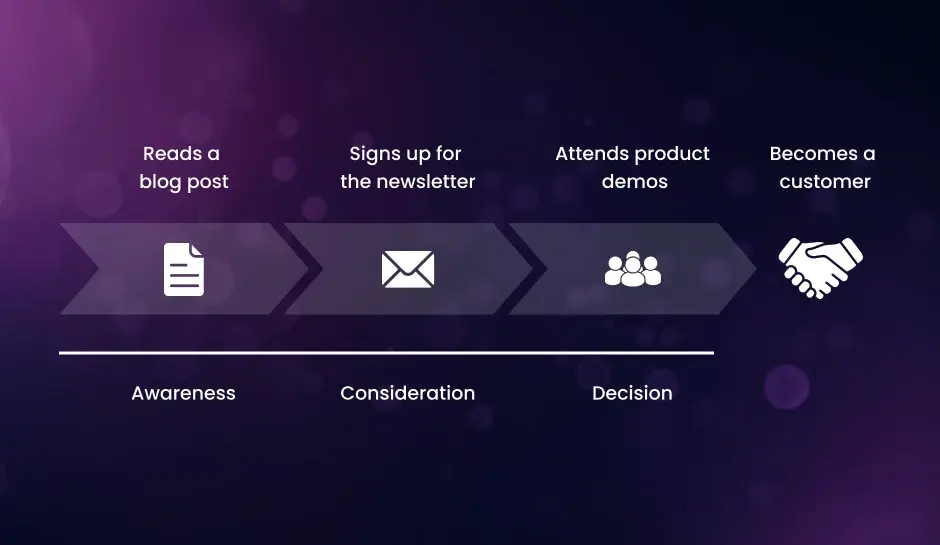
Why Is Google Phasing Out Four Attribution Models?
With the release of GA4, four attribution models are being dropped. In this blog post, we have covered what exactly is happening, why these attribution models are being phased out, and what it means for businesses.
An end is only a beginning in disguise.” – Craig D. Lounsbrough
Attribution models are a godsend for any marketer with the gumption to not just do things right but prove that things are going right.
Marketing attribution models are used to measure the impact of each marketing and advertising touchpoint on a conversion. And Google is making a major change to its attribution models.
With the release of Google Analytics 4 (GA4), four attribution models are being dropped – Last-Click, First-Click, Time Decay, and Position-Based models.
Let’s explore exactly what is happening, why these attribution models are being phased out, and what it means for businesses. Shall we?
The Real Story Behind the Phase-Out
Google Ads and GA4 are saying goodbye to First-Click, Linear, Time-Decay, and Position-Based attribution models. These models assign credit/value to each touchpoint based on pre-defined rules and help businesses understand which marketing channels are driving the most value so that they can optimize their marketing spend accordingly.
The downside of these models is that they’re based on historical data and do not account for the complexity and diversity of customer journeys.
And what Google wants to do is make data-driven attribution the default model for web conversions because data-driven attribution uses Google AI to understand the impact of each touchpoint on conversion.
This change is happening because Google wants to provide more precise, accurate, and privacy-centric insights to marketers. Google will employ ML to assess data from the conversion pipeline, without having to rely on the customer’s last interaction alone.
Now, let’s look at why Google is phasing out these models.
The Reasons for These Changes to Attribution Models in Google Ads and Google Analytics
Marketing attribution is a team sport, not an individual sport. The aim of attribution is to ensure that it’s not just the quarterback a.k.a. the last touchpoint that gets the MVP award each time but the contributions of the center, guard, wide, tackle, and end players a.k.a all the other touchpoints are recognized as well.
The models that Google is ditching do not give enough credit to campaigns. This is a problem for marketers, advertisers, users, and Google itself. Here’s a detailed look into why Google is phasing out these models:
1. Lack of Accuracy:
The Last-Click attribution model, which gives all credit to the last touchpoint before conversion, has been the default attribution model in Google Analytics for a long time. However, this model doesn’t take into account the other touchpoints that may have contributed to the conversion. Similarly, the First-Click attribution model gives all credit to the first touchpoint, which may not accurately reflect the customer’s journey. The Linear and Time Decay models offer a more balanced approach, but they still fall short when it comes to capturing the entire customer journey. These models often result in overvaluing certain touchpoints and undervaluing others, leading to inaccurate data and poor marketing decisions.
2. Customer Behavior:
With customers engaging with businesses through multiple touchpoints, including social media, search engines, email, and more, customer behavior has changed significantly over the last few years. For instance, a customer may have discovered a business through social media, engaged with them through email, and made a purchase through a search engine. In this case, the traditional attribution models would only give credit to the search engine, completely ignoring the other touchpoints.
3. Cross-Device Tracking:
Customers are now engaging with businesses from multiple devices, such as smartphones, tablets, and desktops. This makes it challenging to track the entire customer journey accurately, as traditional attribution models only track the activity on a single device. This can lead to inaccuracies in attribution and poor marketing decisions, as businesses may not be aware of the full customer journey.
4. The Need for Real-Time Data:
Traditional attribution models are based on historical data, which means they cannot provide real-time insights into the customer journey. In today’s fast-paced business environment, real-time data is essential to make informed marketing decisions. The GA4 model uses ML algorithms to provide real-time insights into the customer journey, enabling businesses to optimize their marketing spend in real-time.
The Sunset Timeline
- May 2023
- June 2023:
- September 2023:
For Google Analytics 4 properties, linear, time decay, first-click, and Position-Based models will not be available for any new conversion actions.
For Google Ads accounts, linear, time-decay, first-click, and position-based models will not be available for any new conversion actions.
Google will sunset these four attribution models in both GA4 and Google Ads.
The Future is Data-Driven
Data-driven attribution may be more complex and may require more data to be effective but it is sure to provide a more accurate representation of your customer journey. Without data-driven attribution, you could be making marketing investments in the wrong places.
The absence of data-driven attribution is a problem for marketers, advertisers, users, and Google itself. The users may be surfacing ads at the wrong touchpoint, leading to a lower conversion rate for marketers and advertisers.
It’s a problem for Google as it needs to ensure that ads on its platform are relevant to users, because, well, with every click they get paid. So, it’s in their best interests for users to engage with campaigns and ads.
Understanding Attribution
In the ever-evolving world of marketing, understanding attribution is crucial for successful campaigns. Attribution is the process of identifying and assigning value to the various touchpoints a customer interacts with on their path to conversion. By analyzing these touchpoints, marketers gain valuable insights into user behavior and can make informed decisions to optimize their strategies.
There are several attribution models that marketers rely on to understand user behavior:
- Linear Attribution
- Decay Attribution
- Time Decay Attribution
- Position-Based Attribution<
The linear attribution model distributes equal credit among all touchpoints in a customer’s journey. It gives equal importance to each touchpoint, regardless of its position or impact.
The decay attribution model assigns more credit to touchpoints that occurred closer to the conversion. It recognizes that as customers near the end of their journey, certain touchpoints have a stronger influence on their decision-making.
Similar to decay attribution, the time decay model gives more weight to touchpoints that are closer in time to the conversion. However, it follows a more gradual decay curve, with the touchpoint immediately preceding the conversion receiving the most credit.
In the position-based attribution model, touchpoints at the beginning and end of the customer’s journey are deemed most impactful. These touchpoints receive the majority of the credit, while those in the middle are given less significance.
Understanding these attribution models is essential for marketers aiming to gain a comprehensive view of user behavior. By utilizing them, marketers can make informed decisions on budget allocation, campaign optimization, and audience targeting.
Google’s Announcement
Google has recently made an important decision that is set to shake up the world of digital advertising. They have announced that they will be removing four attribution models from their platform, taking marketers and advertisers by surprise.
So, what led to this unprecedented move? Google has explained that the removal of these attribution models is driven by their ongoing effort to improve the accuracy and effectiveness of advertising measurement. By eliminating models that are outdated or ineffective, Google aims to provide marketers with more reliable data and insights.
One of the key reasons behind the removal of these attribution models is the increasing complexity of digital advertising. As the digital landscape continues to evolve, it has become clear that these models are no longer able to accurately attribute conversion credit to the appropriate touchpoints along the customer journey.
Moreover, Google recognizes the need for a streamlined and simplified approach to attribution. By eliminating these redundant models, Google seeks to create a more user-friendly interface and ensure easier accessibility to attribution data.
Google’s objective is to enable marketers to make data-driven decisions based on accurate and comprehensive metrics. By removing outdated attribution models, Google believes they can empower advertisers to optimize their campaigns and maximize the return on their advertising investments.
This announcement has undoubtedly sparked discussions and debates within the digital marketing community. Marketers are now left to reassess their attribution strategies and find alternative models that align with Google’s new approach. The impact of this decision on digital advertising as a whole is yet to be fully realized.
In the next section, we will delve into the potential implications of this Google announcement on the world of digital advertising and explore alternative attribution models that marketers can consider moving forward
Impact on Digital Advertising
With Google’s decision to remove four attribution models, digital advertisers are now left wondering about the impact this will have on their advertising strategies. Let’s delve into the potential consequences and explore how this change affects conversion tracking and data analysis.
Analysis of the influence of the removal on digital advertising strategies
The removal of four attribution models by Google presents a significant shift in the way digital advertising strategies are formulated. Advertisers will need to reassess their approach to attribution and find new ways to measure the effectiveness of their campaigns.
Past reliance on the now-removed models might have provided insights into various touchpoints along the customer journey, thereby helping advertisers optimize their campaigns effectively. Without these models, marketers will need to explore alternative attribution strategies and adopt a more comprehensive approach.
Effect on conversion tracking and data analysis
Conversion tracking and data analysis are critical components of any successful digital advertising campaign. The removal of four attribution models may result in challenges in accurately tracking conversions and analyzing campaign performance.
Previously, these attribution models allowed advertisers to attribute conversions to specific touchpoints, enabling them to understand which channels were contributing most effectively. Without these models, marketers will need to rely on alternative methods like first-click, last-click, or linear attribution to track conversions, which may not provide as nuanced insights.
Additionally, the loss of these attribution models will require marketers to adapt their data analysis methods. They will need to find new ways to extract meaningful insights and make informed decisions about their digital advertising efforts. Exploring alternative attribution models and leveraging tools like Google Analytics can help fill this data analysis gap.
Alternative Attribution Models
When it comes to tracking the success of your digital advertising campaigns, Google Ads offers a variety of attribution models that can provide valuable insights. Let’s take a closer look at the remaining attribution models available in Google Ads:
- First Click Attribution
- Last Click Attribution
- Data-Driven Attribution
In a First Click Attribution model, the conversion credit is given to the ad or keyword that first led the user to your website. This model focuses on the initial touchpoint and is useful for understanding how your ads generate interest and attract new visitors. It can be particularly effective for brand awareness campaigns.
The Last Click Attribution model, on the other hand, gives all the credit for the conversion to the final ad or keyword that led to the conversion. This model highlights the closing touchpoint and is beneficial for analyzing the effectiveness of your ads in driving immediate actions, such as purchases or sign-ups.
Data-Driven Attribution is a more advanced model that uses machine learning to allocate conversion credit to different touchpoints based on their influence. This model takes into account various factors such as ad interactions, clicks, impressions, and other data points to determine the attribution credit. It’s especially beneficial for advertisers with larger data sets who want a more accurate representation of their customer journey.
Understanding the characteristics and suitability of each attribution model is crucial for choosing the right one for your campaigns. First Click Attribution can help you evaluate the effectiveness of your initial interactions, Last Click Attribution sheds light on your closing touchpoints, and Data-Driven Attribution offers a more comprehensive and data-backed approach.
By leveraging these alternative attribution models, you can gain valuable insights into different aspects of your campaigns and make data-driven decisions to optimize your advertising efforts.
Leveraging Google Analytics
With the recent removal of four attribution models by Google, advertisers are left wondering how they can effectively evaluate their marketing efforts. Fortunately, Google Analytics offers a range of features that can compensate for this loss.
Compensating for the Removal of Attribution Models<
While the removal of four attribution models may seem like a setback, Google Analytics provides various ways to analyze user behavior and measure marketing performance. By harnessing the power of this platform, advertisers can still gain valuable insights into their campaigns.
- Understanding User Behavior
- Measuring Marketing Performance
- Gaining Actionable Insights
- Overcoming Challenges
- Strategies for optimizing conversion tracking and campaign performance
One of the key features of Google Analytics is its ability to track user behavior on websites and within digital marketing campaigns. Through the use of event tracking and goal conversions, advertisers can identify the actions users take on their websites and determine how these actions contribute to marketing success.
In addition to tracking user behavior, Google Analytics allows advertisers to measure the performance of their marketing efforts. Through the use of custom reports and advanced segments, advertisers can analyze the success of specific marketing channels, campaigns, or even individual ads. This data can help identify areas that require optimization and inform future marketing strategies.
By leveraging the capabilities of Google Analytics, advertisers can gain actionable insights that go beyond simple attribution models. They can delve deeper into the customer journey, identify pain points, and optimize their marketing funnels accordingly. This data-driven approach enables advertisers to make informed decisions and drive better results.
Overall, while the removal of four attribution models presents a challenge, advertisers can overcome it by leveraging the robust features of Google Analytics. By understanding user behavior, measuring marketing performance, and gaining actionable insights, advertisers can continue to optimize their campaigns and drive success in the ever-evolving digital advertising landscape.
The removal of four attribution models by Google poses several challenges for marketers. However, with careful planning and strategic implementation, these challenges can be overcome.
Addressing potential challenges faced by marketers following the removal
One of the major challenges faced by marketers is the loss of valuable data and insights. With the removal of four attribution models, marketers need to find alternative ways to gather accurate and comprehensive data. Implementing a robust data collection strategy, utilizing other available attribution models, and leveraging advanced analytics tools can help mitigate this challenge.
Another challenge is the need to reevaluate marketing strategies and tactics. Marketers must revisit their existing campaigns and make necessary adjustments to optimize campaign performance without the support of the removed attribution models. This may involve exploring new channels, targeting specific audience segments, or experimenting with different messaging techniques.
To overcome these challenges, marketers can focus on optimizing conversion tracking and improving campaign performance. By leveraging Google Analytics, marketers can identify the most effective touchpoints in the customer journey and allocate resources accordingly.
Additionally, marketers can explore the use of first-party data, such as customer surveys and feedback, to gain insights into customer preferences and behaviors. By collecting and analyzing this data, marketers can refine their targeting strategies and deliver personalized experiences to their target audience.
It is also crucial for marketers to actively monitor their campaign performance and make data-driven decisions. Regular analysis of key metrics, such as click-through rates, conversion rates, and return on ad spend, can help identify areas of improvement and guide optimization efforts.
Adapting to the removal of the four attribution models may require marketers to adopt a more agile and experimental approach. By testing different attribution models, tracking methodologies, and measurement frameworks, marketers can identify the most effective strategies for their specific goals and target audience.
Remaining Opportunities
With the removal of specific attribution models by Google, it is important for businesses to identify and capitalize on new opportunities that arise. Here are some strategies to consider:
Identifying new opportunities arising from the removal of specific attribution models
- Explore other attribution models
- Analyzing customer behavior
- Experiment with new channels
- Focus on the most impactful touchpoints
- Optimize marketing channels
- Refine audience targeting
While Google may have removed certain models, there are still other options available. Take the time to understand and test different attribution models to find the one that best aligns with your business goals.
With the changes in attribution models, it becomes crucial to analyze customer behavior and understand their journey. By gaining insights into the touchpoints and channels that drive conversions, you can optimize your marketing efforts accordingly.
As certain attribution models no longer exist, it provides an opportunity to experiment with new marketing channels. Test different platforms, such as social media or influencer marketing, to diversify your reach and potentially uncover untapped audiences.
Aligning marketing efforts with the available attribution models
While the removal of attribution models can be challenging, it also presents an opportunity to realign your marketing efforts with the available models. Consider the following:
By analyzing data from the remaining attribution models, you can identify the touchpoints that have the highest impact on conversions. Allocate your marketing resources to these touchpoints for optimal results.
With a shift in attribution models, it may be necessary to optimize your marketing channels. Explore ways to improve the performance of your existing channels and ensure they are aligned with the attribution models you are using.
Take advantage of the available attribution models to refine your audience targeting. By understanding which channels drive conversions, you can create more targeted campaigns and increase your chances of reaching the right audience.
Wrapping Up
The time to switch to data-driven attribution is now! And once you do, you’ll be able to get more precise, accurate, and actionable insights into how your campaigns influence conversions and where exactly you need to allocate your marketing budget.
If you’re the coach who enables this switch, your whole team is sure to love you, not just the quarterback. You can quote us on it!
Do You Want to Make the Switch to Data-Driven Attribution? Let’s Talk!
Our marketing analytics hotshots are suckers for data-driven attribution and they’d love to pitch in. Just write to us at info@diggrowth.com and we’ll take it from there!
Ready to get started?
Increase your marketing ROI by 30% with custom dashboards & reports that present a clear picture of marketing effectiveness
Start Free Trial
Experience Premium Marketing Analytics At Budget-Friendly Pricing.

Learn how you can accurately measure return on marketing investment.
Additional Resources
The Future of Marketing: How Predictive Lead and Account Scoring is Changing the Game
Can we, in this incredible marketing landscape driven...
Read full post postCloud Wars: A Comparative Analysis of Leading Cloud Vendors
How many companies are using cloud computing? Around...
Read full post postContent Marketing Attribution: Tracking Content Impact Across the Customer Journey
So, you've poured your heart into crafting the...
Read full post postFrequently Asked Questions
Marketing attribution models are used to measure the impact of each marketing touchpoint on a conversion. They assign credit or value to different marketing channels or touchpoints based on predefined rules. Attribution models help businesses understand which marketing efforts are driving the most value and optimize their marketing spend accordingly.
Google is phasing out certain attribution models, including Last-Click, First-Click, Time Decay, and Position-Based models, because they have limitations in accurately reflecting the complexity and diversity of customer journeys. These models often assign all credit to the first or last touchpoint, neglecting the contributions of other touchpoints. They do not account for customer behavior across multiple touchpoints and devices, leading to inaccurate data and poor marketing decisions. Google aims to provide more precise, accurate, and privacy-centric insights by making data-driven attribution the default model, which utilizes Google's AI to understand the impact of each touchpoint on conversions.
There are several reasons for Google's changes to attribution models:
Lack of Accuracy: The traditional attribution models, such as Last-Click and First-Click, do not accurately capture the entire customer journey, overvaluing certain touchpoints and undervaluing others. This leads to inaccurate data and suboptimal marketing decisions.
Customer Behavior: Customers now engage with businesses through multiple touchpoints, making it essential to consider the contributions of all touchpoints in the customer journey. Traditional models often focus on one touchpoint and disregard others, resulting in incomplete data.
Cross-Device Tracking: With customers using multiple devices, tracking the entire customer journey becomes challenging for traditional models, which typically track activity on a single device. This can lead to attribution inaccuracies and incomplete insights.
Real-Time Data: Traditional models rely on historical data, which limits their ability to provide real-time insights. Real-time data is crucial for businesses to make informed marketing decisions in a dynamic environment. The new Google Analytics 4 model utilizes machine learning algorithms to provide real-time insights into the customer journey.
The timeline for phasing out the attribution models is as follows:
May 2023: Linear, Time Decay, First-Click, and Position-Based models will not be available for new conversion actions in Google Analytics 4 properties.
June 2023: Linear, Time Decay, First-Click, and Position-Based models will not be available for new conversion actions in Google Ads accounts.
September 2023: Google will sunset these four attribution models in both Google Analytics 4 and Google Ads.
Data-driven attribution is considered important because it provides a more accurate representation of the customer journey. It considers the contributions of all touchpoints based on data analysis and machine learning algorithms, rather than relying solely on predefined rules. Data-driven attribution offers more precise and actionable insights into how marketing campaigns influence conversions, allowing marketers to allocate their marketing budgets more effectively. Without data-driven attribution, marketers risk investing in the wrong marketing channels or touchpoints, leading to suboptimal results and lower conversion rates. It is also essential for platforms like Google to ensure relevant ads and campaigns for users to maintain engagement and drive revenue.
 Akanksha Dass
Akanksha Dass 

